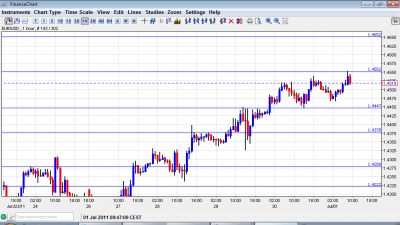Euro dollar is rising gradually and steadily, enjoying the successful Greek votes . This is enough to push higher, but not conquer high resistance, at least for now. There are worries about the global economy We have important events to close the week. Will it break even higher? Or consolidate at these levels?
Here’s a quick update on technicals, fundamentals and what’s going on in the markets.
EUR/USD Technicals
- Asian session: Quiet session saw the pair trading around 1.45.
- Current range 1.4450 to 1.4550.
- Further levels in both directions: Below 1.4450, 1.4375, 1.4282, 1.4220, 1.4160, 1.4120, 1.4030, 1.3950,
- Above: 1.4550,1.4650, 1.47, 1.4775, 1.4882.
- 1.4450 is a key line separating ranges. A break lower could open the door for quicker falls.
- 1.4550 proved to be strong barrier on the downside a few weeks ago and now on the upside, holding strong up to now.
Euro/Dollar rising gradually in range – click on the graph to enlarge.
EUR/USD Fundamentals
- 8:00 European Final Manufacturing PMI. Exp. 52 points.
- 9:00 European Unemployment Rate. Exp. 9.9%.
- 13:55 US Consumer Sentiment. Exp. 72 points.
- 14:00 US ISM Manufacturing PMI. Exp. 54 points. Expectations revised upwards after the positive Chicago PMI.
- 14:00 US Construction Spending. Exp. +0.1%.
For more events later in the week, see the Euro to dollar forecast
EUR/USD Sentiment
- Greek votes pass. Greek parliament passed the austerity measures with a solid majority. Also the second vote passed successfully, despite loud protests. This paves the way for the approval of the next tranche of aid for Greece in the meeting of finance ministers this Sunday. The acting managing director of the IMF, Lipsky, will attend this meeting.
- China and Japan slowing down: The Japanese Tankan Manufacturing Index fell short of expectations and was deep in the negative zone. China’s Manufacturing PMI also dropped to 50.9, lower than expected, and too close to the critical 50 point line that separates contraction from growth. This doesn’t move the dollar.
- Charges against DSK doubted: There are doubts about the sexual assault charges against former IMF chief Dominique Strauss-Kahn. In the meantime, he’s out of the IMF, which will approve the next tranche of aid to Greece, no matter that Greece didn’t fulfill its obligations. This story never smelt right.
- Trichet will raise the rates: The president of the ECB spoke at the European parliament and made it clear that the central bank will raise the rates. The fresh inflation figure was only marginally lower than expected. This won’t stop the hike. The hike will hurt struggling countries, but this doesn’t seem to be of interest to the ECB. A bad unemployment rate today won’t stop Trichet.
- Private sector contribution: German banks concluded their talks with a 3.2 billion contribution. French banks agreed to Greek restructuring. They are the biggest holders of Greek debt. The big question is: Will CDS be triggered under this “voluntary” participation? This is still unclear.
- No QE3: In the press conference that followed the rate decision, Ben Bernanke played down the option of another quantitative easing program. He compared the same period one year ago, and said that employment is rising faster and there is no threat of deflation now. No new dollar printing is good for the dollar. QE2 just ended now. Will we see a stronger dollar?
- Debt Ceiling: One thing that is weighing on the dollar is the looming US debt ceiling. The deadline of August 2nd is getting closer. One option to tackle US debt is to retreat from Afghanistan and Iraq
. US Treasury Secretary Timothy Geithner might quit his job after the budget is approved. This may be positive for the dollar.

